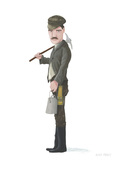On the 9th April 1827 Robert Jenkinson, 2nd Earl of Liverpool, retired from his role as Prime Minister due to ill health. Jenkinson was both the youngest and longest serving Prime Minister, his replacement would be George Canning. Canning would hold the record for being Prime Minister of the United Kingdom for the shortest time, that is 119 days. Canning was King George IV’s choice to replace Jenkinson, he controversially passed over Sir Robert Peel and the Duke of Wellington, they and five other cabinet members would resign over the appointment.
George Canning's time as head of government came to an end when he died in the August, suffering from a chest infection that was the result of a severe cold he had caught at the funeral the Duke of York at the beginning of the year. Thomas Toon was born in the March of 1827, and baptised at the family church in Whitwick on the 25th March, a baby unaware of a
government in chaos.
It is highly unlikely that his parents were aware of it either, his father too busy out with his cart full of pots and pans, the lighter spring mornings enabling him to leave earlier. Thomas’s mother would be tending to his twin brothers, who were only eighteen months older, while he lay in his cot. Thomas’s birth was quickly followed by a brother James, and as the boys grew from babies to children they may have taken it in turns to travel with their father. By the time Thomas was fourteen there were three more children in the house, there would be little time for play, or to run and climb among the ruins of Whitwick castle.
Like the vast majority of children in England, Thomas had no formal education, this was reserved for a minority, all Thomas needed to know he learnt in the lanes of Leicestershire or over the kitchen table. Sunday School would probably be the best he could hope for, but these ‘schools’ stressed a religious education. There was little chance of Thomas gaining a secular education, but this did not mean that he was uneducated, at some point he had learnt to write, for the entry of his marriage in the parish register was signed by him.
George Canning's time as head of government came to an end when he died in the August, suffering from a chest infection that was the result of a severe cold he had caught at the funeral the Duke of York at the beginning of the year. Thomas Toon was born in the March of 1827, and baptised at the family church in Whitwick on the 25th March, a baby unaware of a
government in chaos.
It is highly unlikely that his parents were aware of it either, his father too busy out with his cart full of pots and pans, the lighter spring mornings enabling him to leave earlier. Thomas’s mother would be tending to his twin brothers, who were only eighteen months older, while he lay in his cot. Thomas’s birth was quickly followed by a brother James, and as the boys grew from babies to children they may have taken it in turns to travel with their father. By the time Thomas was fourteen there were three more children in the house, there would be little time for play, or to run and climb among the ruins of Whitwick castle.
Like the vast majority of children in England, Thomas had no formal education, this was reserved for a minority, all Thomas needed to know he learnt in the lanes of Leicestershire or over the kitchen table. Sunday School would probably be the best he could hope for, but these ‘schools’ stressed a religious education. There was little chance of Thomas gaining a secular education, but this did not mean that he was uneducated, at some point he had learnt to write, for the entry of his marriage in the parish register was signed by him.

